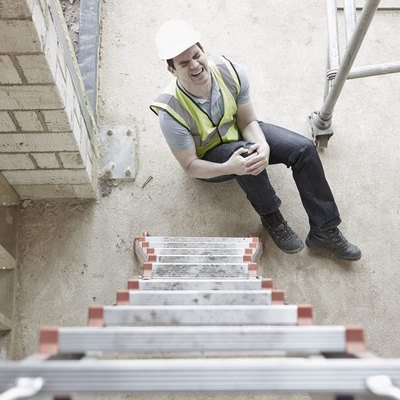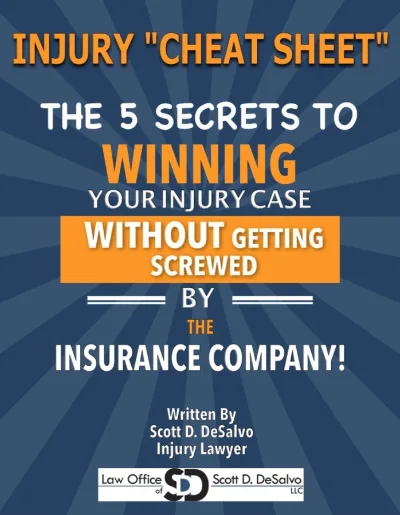
A slip and fall at work is one of the most common ways people who have a work related injury get hurt.
Lots of jobs require hustle and most workers want to do a good job for their employer. As a result, falls happen. If you are injured at work can you sue?
Learning as much as you can about these kinds of cases if you fell at work is one of the smartest things to do. So, I wrote this page to help you know what you or a loved one might be in for if someone got hurt at work in a fall.
Want To Know What Your Slip and Fall Injury Is Worth?
If you got hurt at work, you CAN sue. But it is a little different than many other kinds of cases.
When you get hurt while doing your job in Illinois, you are automatically covered by the law called "The Illinois Workers' Compensation Act". This law (in theory) makes it easier and faster to make sure injured workers get paid, get the medical care they need, get back to work as fast as possible and are taken care of if they can't get back to work after an on the job injury.
So instead of filing a law suit in Court, you file a claim at the Illinois Workers Compensation Commission. In some wayss, a work injury case is similarto for example a car accident. But in many ways, it is not. Procedure and law are different in a work injury or "Workers Comp" case, so make sure you read articles like this to know your rights.
Or talk to a lawyer who knows how work injury cases work if you want to know more about "if you get hurt at work can you sue"?
If You Had A Fall At Work, You Might Have Two Cases.
Any time you get hurt in a fall at work, you probably have a valid Workers Comp case. In Illinois, being hurt on the job almost automatically means you have a Workers Comp case.
Here's how that works:
...then you are very likely to have a good Workers Comp case. It's almost that simple.
But you may also have what is called a 'third party' case in addition to your Workers Comp case.
A 'third party' case is just a regular law suit that gets heard at the Courthouse. Car crashes, dog bites and fall down cases are all examples of third party cases.

Did someone who isn't your employer or who isn't also an employee of your boss cause or contribute to your fall? If that's the case, then you may have a third party case as well as a Workers Comp case.

Yes, it is usually a very good thing. The main reason is that your damages are limited in a Workers Comp case. But your damages are only limited by what a Judge or Jury thinks your case is worth.
Any time one of my clients can make a claim for both, I always tell them that it is the best thing to do. It gives you your best chance to get a full recovery for your injuries.
In a slip and fall Workers Comp case, you don't have to prove anything other than what we discussed above.
But if there is a third party involved, then you should know what we have to prove so you can begin gathering evidence right away.
Knowing what evidence you need to help your lawyer is important after a slip and fall. This leaves you injured, unable to work, and out of money. What do you do if you experience a slip and fall at work?
Although worker’s compensation kicks in for many folks, what if it doesn’t? Or what if you believe the accident was the fault of your employer, and shouldn’t have occurred to begin with?
Here’s everything to know about when you can sue a third party if you are the victim of an accident at work that involves slipping and falling.
When dealing with a slip and fall at work, it’s important to understand that for you to sue your employer, you need to show they were liable for the accident.
Proving fault isn’t simple as an accident occurs. You must make the claim that the employer either ignored or didn’t take action quickly enough to correct a problem.
An ideal example of this is a huge puddle of water that was left standing. You come into work and don’t see the puddle, causing you to slip and fall. (Remember, the puddle had to be created by someone that isn't your employer or your co-worker for you to have a third party case, but you still could do a Workers Comp case).
If your employer wasn’t in the act of getting a mop or attempting to clean up the mess or even show there was a mess present (such as with signs) this presents a problem. Another example would be the workplace not training new employees in proper safety measures.
These are examples showing that there is a lack of concern and you are not the one at fault. Make sure you’re aware of what workplace conditions are present, so you have an accurate picture of what you’re dealing with.

If you don’t look where you’re going, ignore signs that are clearly up around a wet or damaged area noting it is dangerous. Or simply didn’t see someone who was working on the area, this creates an issue. It’s important to show that none of these things were present when your accident happened.
When understanding slip and fall injuries at work, here are certain factors that contribute to them:
Keep in mind other factors such as if you:
Being aware of your surroundings and what caused you to have a problem is crucial to your case. You’ll need to give your lawyer complete information when you file a slip and fall at work suit against your company.
Let’s say you start mopping and get called away to do something else without putting up signs alerting others to a wet floor, and you come back and slip. The fault becomes yours since you were responsible for addressing what caused the slip to begin with.
But if an outside company is at your workplace, and they mop the floor without warning anyone that the floor is wet? This can lead to a good case.
Proving fault in a slip and fall lawsuit is difficult for some folks. This is true for those that played a role in creating the conditions that lead to the accident.
Some examples of problems that weren’t created by you are:
You’ll also need to show that there was no reasonable understanding of the problem or condition. For example, someone who saw signs up about slippery surfaces would infer not to walk quickly in that area.
When pursuing a slip and fall at work, documentation is one of the most important things. This helps your attorney build a strong case, and show how the manager or owner left the area in a state of neglect.
Make a note of:
The more you can prove you weren’t at fault for what occurred, you’re likely to win a slip and fall case against the third party.
Making a Workers Comp claim and/or taking a third party to Court over a slip and fall at work is intimidating. You don’t want to lose your job, but you aren’t comfortable or safe with a company that permits bad conditions.
Would you like to know more about can you sue for slip and fall at work?
If you or a loved one is dealing with a situation like this, give us a call any time, day or night. We are here to help. 312-500-4500


Scott DeSalvo founded DeSalvo Law to help injured people throughout Chicago and surrounding suburbs. Licensed to practice law in Illinois since 1998, IARDC #6244452, Scott has represented over 3,000 clients in personal injury, workers compensation, and accident cases.
No Fee Unless You Win | Free Consultation | 24/7 Availability Call or Text: (312) 500-4500
>>Read More
Main Office:
1000 Jorie Blvd Ste 204
Oak Brook, IL 60523
New Cases: 312-500-4500
Office: 312-895-0545
Fax: 866-629-1817
service@desalvolaw.com
Chicago and Other Suburban Offices
By Appointment Only